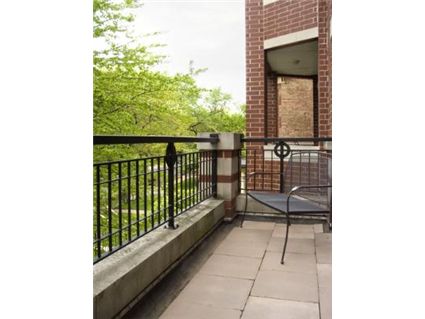Selling Less Than a Year Later: 615 W. Deming in Lincoln Park
How realistic is it to list in this market for more than you paid for a property less than a year ago? (if no extensive renovations were done?)
We’ll soon find out.

Take this two bedroom unit at 615 W. Deming in East Lincoln Park.
It last sold in August 2007 and is back on the market 11 months later for $50,000 more.
Here’s the listing:
PRIME LINCOLN PK LOCATION! GRACIOUS DUPLEX IN SMALL ELEVATOR BLDG OVERLOOKS LAWN & TREE-LINED STREET . 2-CAR GAR INCL. ABUNDANT UPGRADES & CUSTOM BUILT-INS. 1ST FL: LR/DR W/ FPL & VAULTED CEILING; LARGE TERRACE; OPEN GRANITE KIT W/ BREAKFAST BAR; FULL BR & BA.
2ND FL: MASTER SUITE W/MRBL BATH, SEP SHOWER, WALK-IN CLST; HUGE FAM RM/DEN W/COMPUTER WORKSTATION. HRDWD FLRS. W/D IN-UNIT. PETS OK. NEAR PARK






There are no pictures of the kitchen (outside of the partial you see above) or the baths.
Unit #302: 2 bedrooms, 2 baths, 2000 square feet, family room
- Sold in August 1999 for $415,000
- Sold in August 2007 for $725,000
- Currently listed for $775,000 (includes 2 parking spots)
- Assessments of $466 a month
- Taxes of $7928
- Koenig & Strey has the listing
since the internet always is full of semi-baseless guesses, I’ll throw in my few….
1. probably an unplanned move? relocation, divorce, financial pressures, etc. Bad tactical move to newly list your house in July at the back half of the selling season.
2. pricing above $50k out of necessity to cover loans? with HELOC, etc. Don’t have access to lexis-nexis to double-check.
conclusion unit will get drowned out for attention by other supply unless realtor is really aggressive with marketing.
The seller but 20% down. It’s a nice looking place but pricey at $387.50 a sq ft.
By what stretch of the imagination do the seller and realtor believe this thing has appreciated since August? Either they figure they got a really good deal or they are pricing it high to negotiate down?
It seems to me that many sellers- if they MUST sell for some reason after only owning a year- feel that it is their right to list for $40k or $50k higher in order to cover their realtor fees and the transfer tax.
Why should a buyer pay for those fees?
Ultimately, these properties end up with multiple price reductions and stay on the market longer.
But we’ll have to wait and see on this particular property.
Any guesses as to what the plywood-looking thing is in the background of the balcony picture? The kitchen doesn’t look freshly redone, and the other rooms look like nothing special — I don’t see much opportunity for $50K of remodeling.
With 20% down, the seller isn’t in a bad situation with respect to closing, so the $50K premium isn’t required for closing costs. They did need to get a jumbo loan last August, so it is possible that there is a teaser rate being reset. (An ARM shouldn’t move much, since rates are close to year-ago levels.) To me, it looks like any financial pressure must not involve this place. Plenty of other sources, however.
The mortgage is in only one name (that data on the deed seems to be missing in CCRD), so divorce seems less likely (or much more complicated).
Given the high price, I’d bet marriage is driving the sale. There doesn’t seem to be any time pressure.
“Any guesses as to what the plywood-looking thing is in the background of the balcony picture?”
I’m thinking it’s the exterior from two buildings over.
How about the fact that not only are they asking for an additional 50k, but they also bought at the top of the boom? By my napkin math I think they probably overpaid by 150k – 250k, depending if the previous owners did any work.
SSDD
Another delusional seller who believes their particular, “unique” unit defies the overall market.
These overpriced condos are a lot like people’s kids: nobody has a kid that isn’t “a genius” or in the “gifted and talented” program. At this rate cold fusion must be right around the corner waiting for little Johnny to get to highschool.
Is it really that hard for listing realtors to consider the potential buyer’s perspective? What else will that buyer be looking at? Why would they pay more just because the seller feels entitled?
“Is it really that hard for listing realtors to consider the potential buyer’s perspective?”
The realtor may well be pushing for a reasonable price, but it doesn’t mean that the seller will play along. With the oversupply of agents these days, the sellers will be able to find someone willing to play along for a tiny chance at a commission.
The American homeowner now thinks that s/he has a God-given right to home appreciation- that you should be able to realize a hefty return on your house just by occupying it.
It still has not sunk in that the days of automatic appreciation are over, probably for a long time, and that house prices and appreciation will revert to historic norms.
The idea that people are ENTITLED to house appreciation, or to even necessarily get back what they paid, is the idea driving the ‘bailout’ legislation. That, as well as the needs of the banks that profited so richly in the short run from the rampage, but are now being visited with the consequences of their corruption and carelessness over the past 10 years.
We need to learn that you aren’t entitled to anything, and that a return on your purchase is not a natural right.
Totally unrelated, but I think we should start a blog about the ongoing Fannie Mae/Freddie Mac crisis and the potential effects on the mortgage industry/real estate market, especially on Jumbo Loans and Real Estate above $417k. Any thoughts?
Thoughts?
They’re insolvent. The shareholders will get nothing (hence the price crash); the real question is the bonds.
The government guarantee was never in writing or even publicly acknowledged. It was just sort of implied. Does it exist or not? We are probably about to find out.
If it does not exist – the housing market stops. No more loans. Disaster.
If it does exist – the Treasury takes on $5 trillion in debt (keep in mind that this is more than 2 years worth of US tax revenue). The dollar collapses. Disaster.
You can guess what the market thinks – the dollar, while weak, has stabilized a bit over the past few months. Today, it dropped quite a bit. We are testing all-time lows. Gold is up more than $25. Silver is up. It’s looking really bad for the dollar!
I think the best option might be for the government to charter a brand-new firm that explicitly guarantees the loans. They would have to do it FAST, but this would allow them to let Fannie and Freddie die without killing the dollar OR the housing market.
“The government guarantee was never in writing or even publicly acknowledged. It was just sort of implied. Does it exist or not? We are probably about to find out.”
The Fannie guarantee was explicit prior to the late 1960s, when it became the hybrid it is today. Both Fannie and Freddie also have an explicit $2.5B (or so) line of credit with Treasury.
Of course, with $2.5T each in debt, those lines of credit will be used up rather quickly.
That brand new firm would have to capitalize instantly. If it was possible to do that, Fannie and Freddie would already be doing it.
You are right–disaster either way. Pick your poison. Personally, I’d rather let housing go, because destroying the dollar (which is already barely alive) leaves no meaningful banking system with which to recover. It’s like choosing between killing the horse or the colt during a difficult birth. Leave the mother alive, she might still be able to have more babies. Let her die, and not only can she not have more babies, but the colt might die anyway.
I think that the chaos-minimizing solution to Fannie and Freddie is going to be to shut down their mortgage generation quickly while assuming their debts (with an intention of selling those over months or years).
That would crater the housing market, but it would keep banks solvent. If GSE debt starts defaulting, a disturbingly large number of banks would go under — their GSE bonds total more than their capital.
A possibility might be to shut down one (Freddie) while letting the other (Fannie) continue to operate. That might provide enough of a transition period for bank mortgage generation to resume, and it might allow Fannie to continue to raise debt at low rates (maybe Treasury+100bps — it was +75bps earlier this week).
Re banks and GSE debt — Fannie and Freddie bonds have long been counted as nearly Treasury-quality for bank capital/reserve purposes. Thank the Fed and FDIC for another component of the bubble.
(FDIC gives GSE bonds a 20% risk weight; if the “guarantee” went away that would increase to 100% and Tier 1 capital ratios at many banks would plummet.)
I think the Fed instead may inflate and devalue our way out of this. It actually makes the most sense and causes the least painful way out. Afterall with inflation we’re also devaluing the massive existing public debt as well.
Fannie and Freddie: I don’t think they will be allowed to default on their bonds nor do I think the government will assume all of their liabilities. Instead look for a blank check line of credit to the tune of tens of billions to a hundred billion or so. Its something our government can afford. No way will the Fed or Treasury take their entire portfolio–they don’t need to.
Lehman: we could stand to lose the #1 underwriter of these junk MBS securities (Bear Stearns was #2). Good riddance to them.
$100B is about 2% of the GSE bonds. I could have sworn that mortgage default rates were already that high and increasing fast. With the deflation in real estate prices, even high quality conforming loans are going to get hurt.
Bernanke made his choice, and its “goodbye dollar” (but homes are saved). Discount window is OPEN, yes you read that right, OPEN to the GSEs.
The FED has decided to inflate its way out of this mess.
“Discount window is OPEN to the GSEs”
Excuse my ignorance but what does that mean?
It’s still early — bank failure announcements usually come right at close of business on Fridays (about 4pm here). I’m looking for the FDIC to announce IndyMac and maybe one other bank today, and some bit of government (probably the Fed, but maybe Treasury) to do something for Fannie or Freddie before Monday.
“Discount window is OPEN to the GSEs”
I haven’t seen the full details of Bernanke’s statement, but that should mean that Fannie and Freddie (the GSEs) can borrow money directly from the Federal Reserve at the “primary discount rate” (for stable banks) of 2.25%. That borrowing is normally only overnight, but since Bear Stearns crashed I believe that the borrowing is much longer (indefinite?).
Basically, the Federal Reserve Banks are now capitalizing Fannie and Freddie. The Fed can create enough (electronic) money to support the entire $5T mortgage portfolio.
INDYMac was tits up hours ago. The media for some reason just hasn’t announced it yet.
AD,
In other words than Kevins, the FED’s money-printing press (and I mean that literally) has been turned on for Fannie and Freddie, which literally billions, possibly even a trillion, in the hole. And you know what increased money supply means: it’s not worth as much. The dollar started plunging about an hour ago, right after word came down about the discount window opening. And the dollar, she didn’t have much there to begin with.
Also, Steve? Say byebye to your 6% mortgages, too.
“Also, Steve? Say byebye to your 6% mortgages, too.”
Well, existing fixed rate mortgages are golden. I’m really glad I just bought.
Adjustables and all new mortgages are going to be moving higher, quickly.
Discount window is looking like a nasty rumor that I (and the market) was taken in by. Question is, who started it? Was rumor deliberately floated to see what would hapen? (Q: Will the dollar tank? A: Yup…)
The discount window rumor hit the wires big. CNNMoney reported that Reuters was spreading it:
“Shares of Freddie even moved briefly higher Friday afternoon following a report from wire service Reuters that said Bernanke had told Freddie Mac CEO Richard Syron that Freddie and Fannie would be eligible to borrow money directly from the central bank through what is known as the discount window.”
Here’s a question for you, Kevin–why is the IndyMac BK not public yet? Is that a rumor too? And if it’s a rumor, WHY is it a rumor? Shouldn’t it have been closed days ago? Have you seen the IndyMac’s CD rates this week after their earlier announcement re: stopping mortgage lending? Clearly trying to get as many FDIC insured deposits as fast as possible before being shut down… Really disgusting business.
OR (my conspiracy theory part of my brain running rampant), did the FED deliberately float rumor re: discount window deliberately, to stop the bloodflow from Fannie and Freddie today? Hoping that panic peters out over the weekend?
Frankly, it’s the best explanation I can think of… and it worked. (Short of the rout of the dollar, and the fact that if the plan doesn’t work, it makes Monday even uglier).
ALSO! Are they waiting to announce IMB because they are going to announce LEH at the same time, and they figure one big bomber is better than two smaller ones?
(and is this how rumors get started?)
(and who are “they”?)
(Ok, back to my bunker with my beans, rice, distilled water)
Some hedgefund or trader made a boatload of illicit gains today by getting the news companies to buy that wire story. The money trail is easy enough to follow but I doubt they will be prosecuted, they rarely are. News companies are very easy to fool, especially when real money is involved.
I would need to check the exact timing, but both Fannie and Freddie rebounded substantially this afternoon (like from 40% down to even). That may help avoid another “$2 for Bear” PR fiasco if a buyout happens this weekend.
The discount window rumor almost certainly started after the European markets closed, which gives until mid-day Sunday before the next large (non-US) currency market opens. Plenty of time for things to calm down. (Anything to keep China from dumping their rumored $400B of GSE bonds.)
Kevin, now you’re speaking my language. 😉 🙁
“Kevin–why is the IndyMac BK not public yet?”
It may not be a full-blown shutdown (I haven’t heard anything on bankrupcy) — the FDIC may be able to take over just the bank bit if it is sufficiently separate from the mortgage servicing (and originating) arms.
FDIC (the official source) seems to deliberately bury bank closing information by announcing it late on Fridays. IndyMac is bigger than most failures (maybe biggest since the S&L days), so they may be trying to bury it deeper.
yeah, but given its size, that’s exactly why waiting until Friday afternoon makes no sense. It can’t be buried. And IndyMac could behave VERY badly in the few days between the first announcement of the firings and the mortgage-stop, and the final take-over or bankruptcy announcement. That’s why I mentioned the CDs which were paying like a whole percentage point above anyone else all last week… A lot of this just smells extremely fishy.
Kenworthey,
The CD rate is probably management’s hail mary toss to the endzone hoping that something happens. Its free to try and theres a non zero chance (however unlikely) that it will cause money to flow their way. There are sites like fatwallet.com where wealthy and retirees frequently post they’re moving around 100k jumbo CDs for a few extra yield basis points, so who knows. And at the end of the day your money is fully insured to 100k per account.
Yes management still has the potential to destroy equity–this is why the stock is probably trading at a quarter and not zero. In any bankruptcy the creditors will typically give the equity holders some very nominal amount to go away and not interfere with bankruptcy proceedings, call it bus fare, if you will.
that’s kind of my point: they offer very lush CDs in a last ditch effort to stay solvent, because they risk is simply picked up by the rest of us (the FDIC backing). The FDIC shouldn’t let that happen. When the handwriting is on the wall, they should stop new deposits. Nobody believed that Indy would last past the weekend; increasing their CD rates looks like bad misbehavior to me. The old moral hazard of insurance problem…
Anyway, all of this has been extremely interesting to watch. I can’t wait to see what happens over the weekend. Maybe the feds will have found a buyer for Indy. Hell, maybe the feds will find a buyer for Fannie and Freddy. 😉 Where are those rich foreigners who are going so save us??? (Busy buying units in the Spire, I guess…)
“they should stop new deposits”
They halted brokered deposits at the beginning of the week, so they are trying to stanch the flow. Anecdotal accounts say that there hasn’t been any evidence of a run, so there isn’t any cause for emergency action. And the FDIC doesn’t want to operate the bank–they may have been having trouble lining up an approprite acquirer.
Bob… printing our way out of this may be the worst possible solution, I lived through that crap in Brasil and it is ugly watching all wealth just completely destroyed.
My beliefs are much more cynical. Let all loans transfer to the government, then the gov’t stops foreclosing, all debtholders are held to their debt and if you don’t pay it accrues like unpaid taxes ad infinitum and can be put upon your heirs. No losses as you have an offsetting accrual account and the gov’t has all debtholders now as indentured servants for life. Any loss remains with the property purchaser (where honestly it belongs anyway) 8 years ago I wouldn’t have even dreamed of this scenario.
IndyMac toast. FDIC just posted it on their webpage.
“Any loss remains with the property purchaser (where honestly it belongs anyway)”
??
You mean the Buyer from the person who over-extended? Wha?!?
“IndyMac toast”
And taken over by a new entity. Maybe the feds were just giving account holders with over $100k time to move their money?
anon.
I mean the person that signed on to bear the responsibility of the loan, the person who is living in the house, the buyer, the purchaser. As in people need to take some freakin responsibility for their damn actions. I do not want to and refuse to pay for this mess. I pay for my own messes only.
anon.. i accidentally typed debtholders which suggests creditors.. my bad for the confusion.
I mean most of the homes that sold were multiple bidders, many of us paid what we paid because we were unwittingly bidding against people that had no real intention of ever making payments, we suffered once, now let them learn about consequences and have to honor their damn commitments as opposed to making the rest of us have to. It’s one thing to default on the bank, but you can’t default on the gov’t who can keep charging you for life. At first I thought it was a very Orwellian idea, now the more i think about it, I love it. No losses just accrue the receivables.
It is my understanding that the fine print of those IndyMac CDs will determine if the FDIC/future owner/taxpayer pays out the interest. It all depends on when the interest is compounded and how often (and the timing of the takeover).
It is highly probable that a bunch of people tossed $100,000 into a high-yield IndyMac CD in the past week and will be getting exactly $100,000 back in 6-8 months once the FDIC finishes processing things.
That hail mary pass from IndyMac is probably a “screw you” to everyone involved. They were shady from the beginning; no reason to think that they aren’t going out with a flourish.
anon –
Anecdotal accounts say that there hasn’t been any evidence of a run, so there isn’t any cause for emergency action.
Sadly, you aren’t going to see any bank runs like the old days. In order to have a run on a bank, you need lots of people with assets on deposit at said bank – most folks these days can barely scrape together $5000 for a down payment! Too many people live paycheck-to-paycheck, they’ve got nothing saved up in a bank account.
The GSEs got so large precisely because the demand for loans greatly exceeded the amount of money deposited at the banks. The secondary market was the only way to develop the capital required to lend money!
“IndyMac toast”
“And taken over by a new entity.”
That is rather interesting — most recent bank failures have had the bank taken over by another existing bank. In this case, the FDIC created an entirely new bank (run by the FDIC) to take over the IndyMac accounts.
Was IndyMac so big that no one wanted it, or so badly screwed up?
After rereading my post, I should probably clarify a bit.
I do not regret the fact that there are no bank runs. I regret the fact that the economic situation in the US is such that a bank run is not likely to be possible.
“you need lots of people with assets on deposit at said bank”
IndyMac apparently had about 10,000 customers with over the insured limit, to the tune of about $100k average.
“Was IndyMac so big that no one wanted it, or so badly screwed up?”
Probably both.
I had some experience with a few indymac foreclosures a couple years ago. Indymac financed people with terrible credit scores who had no business buying properties. I’m not surprised at all this happened. Indymac is not a client of mine.
I’m also surprised that HSBC hasn’t been in the news more. I’ve seen a number of foreclosures where their second mortgage lien gets wiped out *completely*. HSBC lent heavily in the 20% of 80/20 financing. Supposedly they make a lot of money in Asia to make up for the losses in America, or at least that’s what they tell their shareholders and the regulators. In fact, I’ve seen a number of cases where HSBC forgoes representation to defend their seconds in foreclosure court because additional legal fees are like throwing good money after bad. HSBC is not a client of mine and I’m just talking anecdotally from what I’ve seen.
homedelete, thanks for the tip. I have some money in hsbc direct and they are offering a higher rate than competitors which makes me worried. may be time to bolt…
Back to the original subject. I think it’s an abomination that realtors take listings at prices that won’t sell. I understand why they do it but they’re doing the seller a diservice and wasting their own time. The sad thing is that the seller will probably reward that realtor by letting them keep the listing. So the realtor is rewarded for blowing smoke up…
Back off topic — Tanta over at CR tries to deconstruct the discount window rumor here: http://calculatedrisk.blogspot.com/2008/07/freddie-and-fed-rumors.html
WaPo has a cover story today on it as well.
“The sad thing is that the seller will probably reward that realtor by letting them keep the listing.”
My understanding from boom times was that listing agreements usually ran for 6 months (but that negotiating for shorter was a good idea). If that is still true, it may well work for a realtor to offer high comps and play along with the seller for a month or three — then push the seller to get the price down to a realistic level so that it sells in month 5 or 6.
If the seller has a deadline or seems amenable to lowering the price enough, this would probably earn the realtor the business and commission. It probably wouldn’t be too bad of a reputation hit either, as the rationalizing seller will probably think that the realtor did everything they could and got the best price possible. (Reality will be a bit more harsh: the seller lost 6 months of costs, the price drop over that time, plus the further drop from the stigma of being on the market so long.)
Kevin,
Exactly. From the realtor’s standpoint it makes some sense – though this also costs the realtor in terms of effort during this period. The other problem is that they can miss the peak selling season all together.
As for the term of the contract…it would be advisable for a seller not to sign too long of a deal but even if they do I’ve seen some contracts that have out clauses and even if the contract does not have an out what realtor in their right mind is going to hold an unhappy client to a contract? Uhhh…I guess there might be some out there.